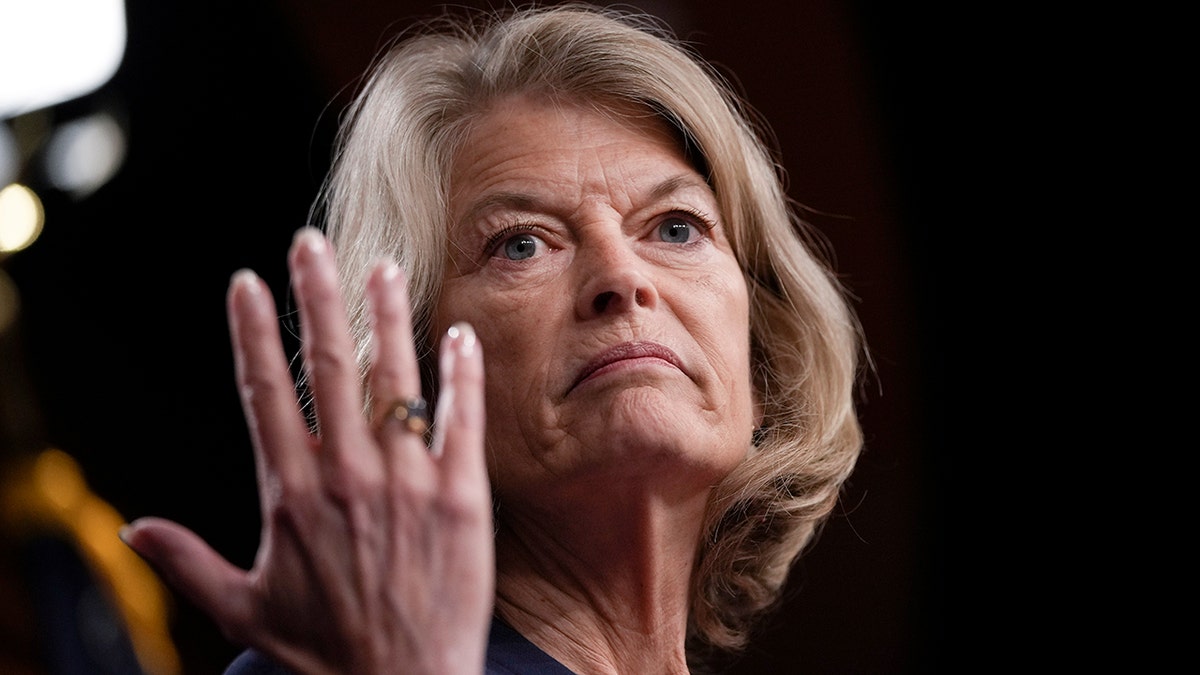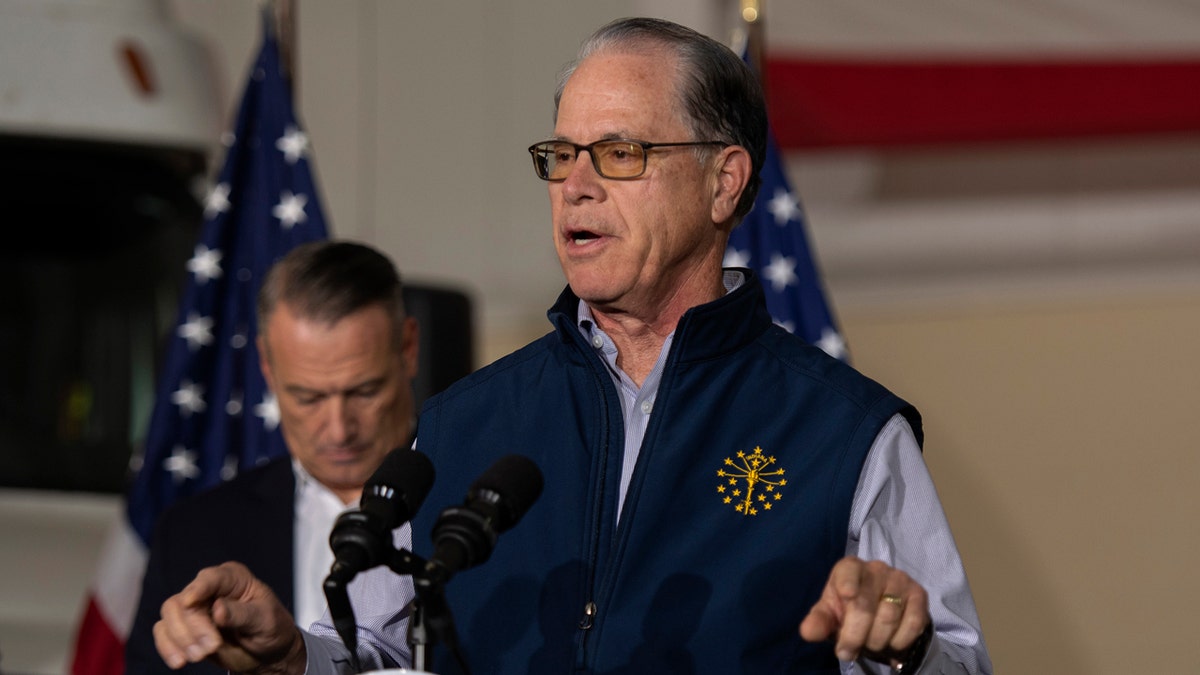INTERNACIONAL
These are the Republicans who voted against Trump’s $9 billion clawback of foreign aid, NPR funding

JD Vance breaks Senate tie on $9 BILLION in Trump cuts
Fox News senior congressional correspondent Chad Pergram reports on Vice President JD Vance breaking a Senate tie on President Donald Trump’s ‘clawback’ bill as the Senate is expected to vote on the package again.
NEWYou can now listen to Fox News articles!
Though Senate Republicans were successful in their mission to pass President Donald Trump’s clawback package, not every member of the conference was on board.
Only two Republicans, Sens. Lisa Murkowski, R-Alaska, and Susan Collins, R-Maine, joined with every Senate Democrat to vote against the $9 billion package geared toward clawing back foreign aid and public broadcasting funding.
SENATE GOP BLOWS THROUGH 2ND HURDLE OF THE NIGHT, TEEING UP TRUMP’S CLAWBACK BILL FOR HOURSLONG DEBATE
President Donald Trump during a meeting with Salman bin Hamad Al Khalifa, Bahrain’s crown prince, not pictured, in the Oval Office of the White House in Washington on July 16, 2025. (Aaron Schwartz/CNP/Bloomberg via Getty Images)
Senate Republican leaders had hoped that stripping $400 million in cuts to Bush-era international AIDS and HIV prevention funding could win over all the holdouts, both public and private. But the lawmakers who voted against the bill had deeper concerns about the level of transparency during the process and the impact successful rescissions could have on Congress’ power of the purse.
Collins, who chairs the Senate Appropriations Committee, said she agreed with rescissions in general and supports them during the appropriations process, but couldn’t get behind the White House’s push because of a lack of clarity from the Office of Management and Budget (OMB) about exactly what would be cut and how.
She said that «the sparse text» sent to lawmakers included little detail and did not give a specific accounting of programs that would be cut to hit the original $9.4 billion target.
TRUMP’S $9 BILLION CLAWBACK PASSES FIRST SENATE TEST, WHILE MORE HURDLES AWAIT

Sen. Susan Collins addresses the press at Washington Crossing Inn on November 6, 2022, in Washington Crossing, Pennsylvania. (Mark Makela/Getty Images)
«For example, there are $2.5 billion in cuts to the Development Assistance account, which covers everything from basic education, to water and sanitation, to food security — but we don’t know how those programs will be affected,» she said.
Murkowski demanded a return to legislating and appeared to warn that lawmakers were just taking marching orders from the White House rather than doing their own work.
Both Murkowski and Collins were also concerned about the cuts to public broadcasting, particularly to rural radio stations. Both attempted to make changes to the bill during the vote-a-rama. Collins’ ultimately decided not to bring her amendment, which would have reduced the total amount of cuts in the bill to north of $6 billion, to the floor. However, Sen. Mark Kelly, D-Ariz., still brought the change for a vote. And Murkowski offered an amendment that would have drastically reduced the cuts to public broadcasting.
The climactic vote for the bill came hours after tsunami warnings rippled through Alaska, and Murkowski argued that federal warnings were relayed through local public broadcasting.
«The tsunami warnings are now thankfully canceled, but the warning to the U.S. Senate remains in effect,» she said. «Today of all days, we should vote down these misguided cuts to public broadcasting.»
Still, both attempts to modify the bill failed to pass muster.
Their decision to go against the package left some scratching their heads. Sen. Ron Johnson, R-Wis., argued that the cuts amounted to less than a tenth of a percent of the federal government’s entire budget.
«This should be a chip shot, OK? I have faith in [OMB Director] Russ Vought,» he said. «I have faith in the Trump administration. They’re not going to cut things that are important spending.»
SENATE GOP AGREE TO STRIP CUTS TO HIV, AIDS PREVENTION PROGRAM FROM TRUMP’S CLAWBACK BILL

Sen. Lisa Murkowski, R-Alaska, speaks during a news conference about high gas prices at the U.S. Capitol on May 18, 2022, in Washington. (Drew Angerer/Getty Images)
Sen. Eric Schmitt, R-Mo., who is leading the bill in the Senate, rebuked the duo’s arguments and said that lawmakers weighing in on the rescissions package was in line with their legislative duties.
«That’s exactly what we’re doing,» the Missouri Republican said. «I would hope that maybe what this will also do is highlight some of the wasteful spending, so when we get into the appropriations process in the next few months that we would be more keen to be focused on saving people money.»
Trump’s bill, which would cancel unspent congressionally approved funding, would slash just shy of $8 billion from the U.S. Agency for International Development (USAID), and over $1 billion from the Corporation for Public Broadcasting (CPB), the government-backed funding arm for NPR and PBS.
CLICK HERE TO GET THE FOX NEWS APP
Some lawmakers, like Sen. Thom Tillis, who earlier this month voted against Trump’s «big, beautiful bill» over cuts to Medicaid funding, understood where the pair were coming from.
The North Carolina Republican told Fox News Digital that Collins, in particular, would be leading negotiations for an end-of-year bipartisan funding deal with Senate Democrats, and to vote in favor of canceling congressionally approved funding could hurt her ability to find a solution to keep the government funded.
«I don’t think people really understand the value of your word and your consistency and your living up to commitments and how important that is to getting things done,» Tillis said. «And this, I think, that’s what Susan’s looking at, I think Murkowski is as well, and I respect them for that.»
INTERNACIONAL
La India es una potencia en ascenso, pero su capital es una cámara de gas letal

6 am, en la Puerta de la India
7:30 am, en Safdarjang Road
8 am, afuera de una escuela secundaria
10:30 am, afuera de un hospital público
12:30 horas, afuera de la oficina de impuestos sobre la renta
17:30 horas, en el mercado de Chandni Chowk
20:00 horas, en la estación de autobuses de Anand Vihar
INTERNACIONAL
Trump forces Indiana GOP into redistricting reversal in race to draw new MAGA map

NEWYou can now listen to Fox News articles!
The Republican-controlled Indiana House returns to session on Monday to take action on congressional redistricting pushed by President Donald Trump.
And the GOP-dominated state Senate, in a major reversal, will reconvene in one week to «make a final decision on any redistricting proposal sent from the House.»
The proposed new map would create another GOP-leaning congressional district in the solidly Republican Midwestern state.
Indiana is the latest battlefield in the high-stakes redistricting showdown pitting Trump and Republicans versus Democrats to shape the 2026 midterm landscape as the GOP defends its razor-thin House majority.
TRUMP TURNS UP HEAT ON FELLOW REPUBLICANS IN PUSH TO REDRAW CONGRESSIONAL MAPS AHEAD OF MIDTERMS
The Indiana legislature on Monday returns to the Statehouse, seen in a file photo from 2017, to consider a congressional redistricting plan pushed by President Donald Trump. (AP Photo/Michael Conroy, File)
State House Speaker Todd Huston announced last week that «House Republicans will gavel in on Monday, Dec. 1, reconvening the 2026 regular session. All legislative business will be considered beginning next week, including redrawing the state’s congressional map.»
Despite pressure from Trump and his political team, Rodric Bray, the Republican leader in the Indiana Senate, announced two weeks ago that there wasn’t enough support in the chamber to move forward with redistricting.
DEEP-POCKETED CONSERVATIVE GROUP ‘ALL IN’ ON HELPING TRUMP REDISTRICTING PUSH
Trump, in response, repeatedly threatened to back primary challenges against state Republican lawmakers who didn’t support his congressional redistricting push.
«A RINO State Senator, Rodric Bray, who doesn’t care about keeping the Majority in the House in D.C., is the primary problem. Soon, he will have a Primary Problem, as will any other politician who supports him in this stupidity,» Trump warned in a recent social media post.

President Donald Trump, seen pointing as he boards Air Force One at Joint Base Andrews, Maryland, on Sept. 11, 2025, is targeting Indiana Republican lawmakers who are not supportive of the president’s congressional redistricting push. (Mandel Ngan/AFP/Getty Images)
Bray confirmed in a statement last week that the state Senate would return into session to take action on whatever redistricting proposal passes the House.
«The issue of redrawing Indiana’s congressional maps mid-cycle has received a lot of attention and is causing strife here in our state. To resolve this issue, the Senate intends to reconvene as part of the regular 2026 session on Dec. 8,» Bray wrote.
Republicans currently control seven of Indiana’s nine congressional districts, and any new map passed by the GOP supermajority in the legislature would likely shift the state’s 1st Congressional District from blue-leaning to a red-leaning seat.
Trump has been twisting elbows in his attempt to make Indiana the latest Republican-controlled state to change their congressional maps. The president has called state lawmakers and Vice President JD Vance visited the state twice earlier this autumn to discuss redistricting.
TRUMP TARGETS RED STATE REPUBLICAN LAWMAKERS IN PUSH FOR CONGRESSIONAL REDISTRICTING
Trump has also taken some jabs at Republican Gov. Mike Braun of Indiana, arguing that the governor «perhaps, is not working the way he should to get the necessary Votes.»

Indiana Gov. Mike Braun, seen speaking during a press conference on Oct. 30, 2025, supports President Donald Trump’s push for congressional redistricting. (Michael Gard/Post-Tribune/Tribune News Service via Getty Images)
While Trump has called Braun «a good man,» he has warned he «must produce on this, or he will be the only Governor, Republican or Democrat, who didn’t.»
But Braun, pointing to the president, has touted that he is «committed to standing with him on the critical issue of passing fair maps in Indiana to ensure the MAGA agenda is successful in Congress.»
NEWSOM TAKES VICTORY LAP AFTER LANDSLIDE REDISTRICTING VICTORY IN CALIFORNIA
The push by the president in Indiana is part of a broad effort by Trump’s political team and the GOP to pad the party’s razor-thin House majority ahead of the midterms, when the party in power traditionally faces political headwinds and loses seats.
Trump is aiming to prevent what happened during his first term in the White House when Democrats reclaimed the House majority in the 2018 midterm elections.
Texas, Missouri, North Carolina and Ohio have drawn new maps as part of the president’s push. And Florida and Kansas are also mulling redrawing their maps.
«We must keep the Majority at all costs,» Trump wrote recently.
But two federal judges in Texas delivered a blow to Trump and Republicans, by ruling that the state can’t use the newly drawn map in next year’s elections. The Supreme Court put in place a temporary stay on the ruling, ahead of weighing in on the dispute.
Meanwhile, Democrats are fighting back.

California Gov. Gavin Newsom speaks during an election night press conference at a California Democratic Party office Tuesday, Nov. 4, 2025, in Sacramento, Calif. (Godofredo A. Vásquez/AP Photo)
California voters a month ago overwhelmingly passed Proposition 50, a ballot initiative which will temporarily sidetrack the left-leaning state’s nonpartisan redistricting commission and return the power to draw the congressional maps to the Democrat-dominated legislature.
That is expected to result in five more Democratic-leaning congressional districts in California, which would counter the passage earlier this year in Texas of a new map that aims to create up to five right-leaning House seats.
CLICK HERE TO DOWNLOAD THE FOX NEWS APP
Illinois and Maryland, two blue states, and Virginia, where Democrats control the legislature, are also taking steps or seriously considering redistricting.
And in a blow to Republicans, a Utah district judge last month rejected a congressional district map drawn up by the state’s GOP-dominated legislature and instead approved an alternate that will create a Democratic-leaning district ahead of the 2026 midterm elections.
donald trump,jd vance,gavin newsom,indiana,midterm elections,house of representatives,republicans elections,elections
INTERNACIONAL
Día Mundial del Sida: científicos divulgaron 10 claves para prevenir la infección

La profilaxis preexposición (PrEP) y la profilaxis postexposición (PEP) son estrategias que incluyen a los medicamentos antirretrovirales para prevenir la infección por el virus de la inmunodeficiencia humana (VIH).
En el caso de la PrEP está indicada antes de una exposición potencial al virus, mientras que PEP se emplea tras una situación de riesgo. Ambas buscan evitar que el virus logre establecerse en el organismo humano.
En el marco del Día Mundial del Sida, que se conmemora cada 1° de diciembre desde 1988 con respaldo de las Naciones Unidas, un panel de expertos publicó hoy una guía con recomendaciones y 10 directrices prácticas para facilitar el acceso a PrEP y PEP en adolescentes y adultos que enfrentan situaciones de riesgo.
La guía fue publicada en la revista Canadian Medical Association Journal. Hoy, 40,8 millones de personas viven con el VIH en todo el mundo, 1,3 millones de nuevas infecciones ocurrieron en 2024, y 9,2 millones de personas aún no acceden al tratamiento, según el último reporte del programa Onusida.

A través de la publicación de la guía, se busca desarrollar una prevención más amplia, sencilla y personalizada.
La coordinación estuvo a cargo de Darrell H.S. Tan, infectólogo de St. Michael’s Hospital, en colaboración con el Instituto Canadiense de Investigación en Salud y la Red Pan-Canadiense para Ensayos Clínicos sobre VIH.
Quieren reducir nuevos casos de personas con VIH a través de la prevención combinada y el acceso temprano a opciones farmacológicas.

El objetivo es eliminar obstáculos administrativos y sociales para que quienes pueden beneficiarse con esos tratamientos accedan sin demoras ni requisitos adicionales.
La guía fue diseñada como referencia clara para el personal de la salud y para el público que busca información verificada.

Los autores de la publicación compartieron estas buenas prácticas:
- Ofrecer consejería sobre PrEP y PEP a toda persona sexualmente activa, incluidos adolescentes y usuarios de drogas inyectables, con información positiva.
- Permitir la prescripción de PrEP a cualquier adulto o adolescente que la solicite.
- Evaluar el riesgo de VIH en cada consulta y sugerir PrEP a quienes se puedan beneficiar.
- Si sexo asignado o identidad de género no están claros, el personal de salud se debe guiar para hacer la indicación según la anatomía y situación del paciente y sus parejas.
- Indicar PEP solo ante exposiciones de riesgo real y cuando la persona fuente pueda transmitir VIH.
- Realizar una prueba de VIH antes de dar PEP, sin demorar el tratamiento.
- No prescribir PEP si la persona fuente es VIH negativa, el estatus es desconocido en la población general o la persona con VIH tiene carga viral indetectable.
- En situaciones dudosas, decidir junto al paciente y nunca demorar el acceso a la terapia.
- Comenzar PEP al instante tras la exposición y seguir durante 28 días.
- Se debería involucrar a autoridades, organizaciones y sociedades científicas para promover y monitorear PrEP y PEP.

Los expertos también especificaron que los fármacos que se deberían indicar como PrEP son:
- Tenofovir disoproxil fumarato/emtricitabina: Esquema diario en comprimidos, considerado la opción preferida para la mayoría de las personas VIH negativas.
- Tenofovir alafenamida/emtricitabina: Puede ser considerado en situaciones específicas, por ejemplo, para personas con problemas renales o de densidad ósea.
- Cabotegravir de acción prolongada: Inyección intramuscular cada dos meses. En la guía afirmaron: “Recomendamos CAB-LA 600 mg como opción de PrEP”.
En tanto, los medicamentos para usar en casos de PEP son:
- Bictegravir/tenofovir alafenamida/emtricitabina
- Dolutegravir más tenofovir disoproxil fumarato/emtricitabina
Ambos esquemas deben iniciarse tan pronto como sea posible después de la exposición (máximo 72 horas) y mantenerse durante 28 días.
Esos medicamentos ya demostraron efectividad y seguridad para la prevención del VIH en personas con diferentes perfiles y necesidades, de acuerdo con las recomendaciones actualizadas de la guía.

En diálogo con Infobae, el médico Marcelo Losso, jefe de la sección de enfermedades emergentes e investigador principal de la Unidad de Investigación del Hospital Ramos Mejía y profesor de farmacología de la Facultad de Medicina de la Universidad de Buenos Aires (UBA) en Argentina, comentó sobre la publicación canadiense.
“La nueva guía de manejo de profilaxis pre y posexposición de VIH de Canadá actualiza la recomendación de ofrecer PrEP, siguiendo la posición que previamente habían tomado otros organismos de países de ingresos altos, como los CDC de Estados Unidos y la Asociación Británica de VIH, entre otros. En cambio, la OMS continúa recomendando la estrategia solo en personas de mayor riesgo”, afirmó.
Losso resaltó: “La guía canadiense expande la oferta de PrEP a todos los adolescentes y adultos que lo requieran, independientemente del resultado de su evaluación del riesgo de infectarse”.
La efectividad poblacional de la PrEP, es decir, la capacidad de la estrategia para disminuir el número de nuevos casos, depende principalmente de que una proporción sustancial de quienes la necesitan acceda a su uso.

“Actualmente, una cantidad marginal de individuos recibe PrEP respecto de quienes precisan la estrategia. Esta situación es global, no exclusiva de la Argentina o de otros países de América Latina, y se debe principalmente a la dificultad de implementar medidas preventivas relativamente complejas en población sana”, enfatizó.
El experto añadió: “Implica incorporar al sistema de salud a personas que no necesariamente consultan y luego seguirlas periódicamente, con controles y entrega de medicación. Sin duda, la prioridad actual para nuestros países de la región debería ser la expansión de la implementación de PrEP en poblaciones en riesgo, donde aún mantenemos un déficit significativo”.
oferta de empleo,farmacia

 CHIMENTOS2 días ago
CHIMENTOS2 días agoWanda Nara involucrada en el escándalo de su abogado, Payarola, contó toda su verdad: “Yo fui…”

 POLITICA2 días ago
POLITICA2 días agoPatricia Bullrich lleva la disputa por el fútbol al Congreso y pone bajo la lupa a la conducción de la AFA

 CHIMENTOS3 días ago
CHIMENTOS3 días ago¡Urgente! Internaron a Rocío Marengo por un problema en su embarazo de 8 meses: «Vieron cosas que preocuparon»

















